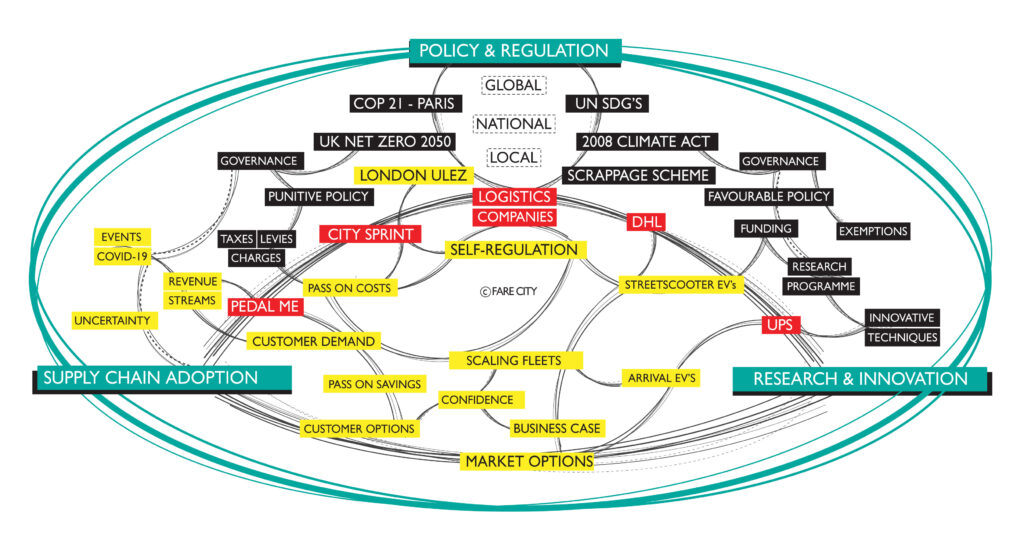Who is responsible for increasing commercial cargo bike uptake?

In spring 2019, the UK government launched two initiatives designed to encourage the commercial uptake of cargo bikes in cities across the country. These were The Department for Transport(DfT’s) The Last Mile paper and the DfT’s eCargo Bike Grant Fund. The pandemic has since led to further government policy in support of the mode, including the DfT’s Gear Change report, which pledges to “extend the e-cargo bike grant programme as part of Government’s wider programme to decarbonise deliveries”.
Though government funding is undoubtedly beneficial, it is just one tool needed to facilitate increased cargo bike use, while central government is just one stakeholder with a responsibility to encourage more socially and environmentally friendly modes. In determining the extent to which other stakeholders are responsible, it is important to consider the complex interplay between the values and aspirations of logistics companies, their customers and the authorities which regulate the operational environment.
Logistics companies
The profile of logistics companies is key to whether they use, or would use, cargo bikes for their commercial operations, and if so – to what extent. Factors which inform a company’s profile include their stage of development (start-up, established, industry leader), their area of operation (including the complexity of their supply chain) and perhaps, above all, the people associated with the company (management, employees, shareholders, and customers).
An example of a start-up logistics company whose profile is not only suited to, but developed around, cargo bikes is London-based Pedal Me. The company’s management decided to exclusively use cargo bikes from its inception, a decision which was informed by the logistical advantages of cargo bikes, the company’s area of operation – in London or intracity – and the more sustainably-minded customers and staff which the company wanted to attract. Though a lack of investment may prohibit a start-up from quickly upscaling their cargo bike fleet, more established companies may, conversely, be hamstrung by an ongoing financial commitment into costly, less sustainable, infrastructures.
One such example of costly infrastructures for logistics companies are multi-fleets. These are transport fleets which comprise multiple modes of transport and are often associated with larger or more established companies – such as City Sprint or Absolutely. Because of a more diverse fleet there is less incentive to push a single mode over others, which often means that for customers who may want to specify a lower-emission mode – such as a cargo bike – there isn’t a default option to do so. An additional impediment to scaling up a single mode may be a company’s unwillingness to renegotiate or break long-standing contracts with customers.
Issues associated with the operation of multi-fleets and the disruption of existing contractual relations are most pronounced for global logistics companies – the true multinationals and industry leaders. Though both DHL and UPS use cargo bikes in European and North American cities, they represent just a fraction of their fleets which span, land, air and sea. The operation of these fleets necessitates the need for guaranteed performance when introducing, or upscaling, modes. A reason commonly cited by large logistics companies for not investing in newer, more sustainable technologies, is that there is a lack of market options available. Arguably, many large logistics companies are simply waiting for their existing fleets to expire, before replacing them with newer, more sustainable, alternatives.

Customers
Regardless of the size or operational model of a logistics company, they would not exist without the customers who use their service. Much of the reluctance of potential customers to use cargo bikes is linked to both perception and confidence. Certain customers may perceive that delivering something by cargo bike as opposed to van is not consistent with their business brand, while questions about confidence may stem from doubts about the logistics company’s ability to deliver a comparable level of service as before.
Options to overcome this include both punitive and favourable policies, issued by either the logistics company themselves, or by the city authorities which govern the operational environment. An example of a punitive company policy may include passing on the costs of using more polluting modes directly to customers. City Sprint has done just this in passing on a £5.00 charge for any jobs within the London Ultra Low Emission Zone (ULEZ) completed via a van or motorbike, thereby encouraging customers to choose more sustainable modes. An example of a favourable policy implemented by a city authority, is the decision by New York’s Transportation Department to allow cargo bikes to park meter-free in existing commercial loading bays, usually the preserve of truck and vans.
City authorities
While a policy to afford cargo bikes the same privileges as trucks and vans may be viewed as simple in theory, in practice, such policies can invite strong opposition from vested parties. London is a prominent example of a city where differing political interests commonly clash, a by-product of the capital’s multiple layers of governance. Despite this, successive London mayors have presided over policies which have fostered incremental change – which cargo bikes are an indirect beneficiary of. On a macro city-level, this ranges from the original congestion charge introduced in 2003, to the more recent ULEZ implemented in 2019.
On a micro city-level, the London borough of Southwark, has, however, specifically increased commercial cargo bike uptake via the use of a Business Improvement District – or BID. BID’s are essentially area-based business bodies, which use the surplus generated by increased business rates to provide additional local services, while increasing competitive advantage for participating businesses.
In 2018, Team London Bridge (TLB), the BID based in Southwark, canvassed the opinion of 400 businesses regarding the feasibility of using cargo bikes for cheaper, greener, and more socially responsible deliveries. An overwhelmingly positive response encouraged TLB to successfully apply for Transport for London (TfL) Healthy Streets funding – which enabled them to launch Bikes for Business. This cargo bike initiative brought businesses and logistics companies together, while demonstrations of the cargo bikes’ capability via expos and trials were soon validated by their subsequent adoption by many local businesses.

Leadership, confidence and the business case
Clearly, the UK government needs to continue leading with policies which both promote the benefits and increase the availability of cargo bikes, while city authorities must foster environments which makes their use as attractive as possible. These can include the use of both punitive and favourable city-wide measures, which will provide more logistics companies and their customers the confidence to invest in the mode. However, while establishing a solid business case is of paramount importance for any large-scale shift to cargo bikes, challenges do remain.
Firstly, city authorities have different levels of commitment regarding the promotion of cycle infrastructure, as recently demonstrated in London by a local council’s decision to remove a cycle lane only seven weeks after they installed it. Secondly, not all logistics companies are geared up to operate cargo bikes. While they may be relatively inexpensive to purchase (especially with a DfT grant), they require high levels of training for companies to realise the productivity gains they can offer successfully. Finally, and perhaps most fundamentally, not enough customers are familiar with what cargo bikes are and what they can do.
Despite these challenges, commercial cargo bikes are here to stay, but will require that stakeholders assume collective responsibility if they are to realise their very considerable potential.









Really useful article, cargo bikes make so much sense in so many urban situations and are so versatile and nimble. Agree that changing mindsets in businesses is required, and this is happening with the increase in visibility of cargo bikes in places like London Bridge. We’ve really only heard positive feedback from those businesses that have taken a punt and trialled them. https://issuu.com/londonbridgerevealed/docs/bikesforbusiness_projectsummary
Cargo bikes are a great method to fill the gap for ‘van’ inefficiencies. Embedding use is the way forward and an important part is to ensure companies get the right logistics model that fits their business. Therefore the method of introduction and correct guidance being the key to opening the door to opportunity.
Setting good professional standards for safety, competent use and representation a must complimented by appropriate training will aid success and once up and running become business as usual.
Through collaboration comes the reality.